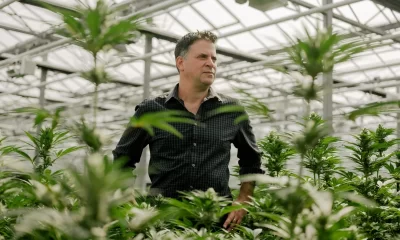Business
Pennsylvania Grant Program Sets Up $200,000 for Hemp Education, Marketing

A new grant program in Pennsylvania aims to promote Pennsylvania state hemp education and marketing projects.
On October 17, the Pennsylvania Department of Agriculture Secretary Russell Redding announced a $200,000 grant program to award organizations striving to promote hemp.
The department aims to award grant funds to reimburse “half of project costs,” with a minimum grant amount of $1,000. Special consideration will be given to applicants who “leverage other funding and private partnerships.”
“Hemp has presented a unique opportunity to grow an industry from the ground up, supplying seemingly limitless sustainable construction materials, fiber and food products,” Redding said in a press release. “These grants will feed a new industry that was once a staple of Pennsylvania’s economy and is again presenting opportunities for farm income and jobs as well as new possibilities for climate-friendly, environmentally beneficial products.”
Applicants are required to have started on or after July 1, 2022 and completed by June 30, 2023 (although the application window ends on December 2).
This is a slight increase from the department’s grant total of $157,735 in 2021, which was used to fund three different projects to boost hemp product awareness as a useful fiber and food: Don Services for hemp as a building material, Team Pennsylvania (also the host of the Pennsylvania Hemp Summit) spearheads education, and Urban Affairs Coalition All Together Now PA, which promoted hemp education as well.
The press release praised Pennsylvania Gov. Tom Wolf’s administration for its support and development of the state’s hemp program. In July at the Pennsylvania Hemp Summit, the state agricultural department announced a $460,000 program to help hemp cultivators and other unique crops through Specialty Crop Block Grants. “We are building a new industry, literally from the ground up,” Redding said at the event.
Back in 2019, Wolf also signed the Pennsylvania Farm Bill, which provided “strategic investments” in state agriculture, and noted the inclusion of hemp as an animal feed.
In other hemp news, tiny homes were created in Europe by Margent Farms using corrugated hemp sheets. The surprisingly spacious two-story homes were created with sustainability, affordability, and design consciousness in mind. “The fibres sequester carbon, locking it in and stopping it releasing back into the atmosphere, resulting in a very low-carbon product. The high cellulose content (60–70%) of the plant makes it a very strong and durable material. The sheet is bound with a sugar based resin made entirely from agricultural waste. Our hemp sheets are a natural alternative to corrugated steel, PVC, bitumen and cement,” the construction company said on its website.
Earlier this summer, North Carolina Gov. Roy Cooper signed a bill to remove hemp from the state’s list of controlled substances. “Agriculture is North Carolina’s largest industry and giving North Carolina farmers certainty that they can continue to participate in this growing market is the right thing to do for rural communities and our economy,” Cooper said in a press release.
A hemp-focused museum exhibit debuted in June in Barcelona, spotlighting the unique uses of hemp as an important trade crop and source of income for merchants in Japan. Called “Cannabis Japonica,” unique clothing samples and literature are on display through February 2023.
Japan is undergoing its own cannabis renaissance as well. While cannabis is strictly regulated, the country’s health officials are proposing that medical cannabis be legalized to align its regulation with other major countries.
A new report from Technavio examined the global industrial hemp market, and projects that the industry could grow up to $6.47 billion in value between 2021 and 2026. Specifically, the report suggests that the leading hemp product will be textiles. “The industrial hemp market share growth in the textile segment will be significant during the forecast period. Hemp fibers possess significant properties, such as high absorption capacity and good thermal and electrical properties, like low static electricity charge and high heat of sorption,” the report states. “Hence, hemp is used in the manufacture of apparel, fabrics, denim, and fine textiles, thus increasing the demand for hemp in the textile segment. Therefore, owing to these factors, the textile segment of the market in focus is expected to grow during the forecast period.”
Source: https://hightimes.com/news/pennsylvania-grant-program-sets-up-200000-for-hemp-education-marketing/
Business
New Mexico cannabis operator fined, loses license for alleged BioTrack fraud

New Mexico regulators fined a cannabis operator nearly $300,000 and revoked its license after the company allegedly created fake reports in the state’s traceability software.
The New Mexico Cannabis Control Division (CCD) accused marijuana manufacturer and retailer Golden Roots of 11 violations, according to Albuquerque Business First.
Golden Roots operates the The Cannabis Revolution Dispensary.
The majority of the violations are related to the Albuquerque company’s improper use of BioTrack, which has been New Mexico’s track-and-trace vendor since 2015.
The CCD alleges Golden Roots reported marijuana production only two months after it had received its vertically integrated license, according to Albuquerque Business First.
Because cannabis takes longer than two months to be cultivated, the CCD was suspicious of the report.
After inspecting the company’s premises, the CCD alleged Golden Roots reported cultivation, transportation and sales in BioTrack but wasn’t able to provide officers who inspected the site evidence that the operator was cultivating cannabis.
In April, the CCD revoked Golden Roots’ license and issued a $10,000 fine, according to the news outlet.
The company requested a hearing, which the regulator scheduled for Sept. 1.
At the hearing, the CCD testified that the company’s dried-cannabis weights in BioTrack were suspicious because they didn’t seem to accurately reflect how much weight marijuana loses as it dries.
Company employees also poorly accounted for why they were making adjustments in the system of up to 24 pounds of cannabis, making comments such as “bad” or “mistake” in the software, Albuquerque Business First reported.
Golden Roots was fined $298,972.05 – the amount regulators allege the company made selling products that weren’t properly accounted for in BioTrack.
The CCD has been cracking down on cannabis operators accused of selling products procured from out-of-state or not grown legally:
- Regulators alleged in August that Albuquerque dispensary Sawmill Sweet Leaf sold out-of-state products and didn’t have a license for extraction.
- Paradise Exotics Distro lost its license in July after regulators alleged the company sold products made in California.
Golden Roots was the first alleged rulebreaker in New Mexico to be asked to pay a large fine.
Source: https://mjbizdaily.com/new-mexico-cannabis-operator-fined-loses-license-for-alleged-biotrack-fraud/
Business
Marijuana companies suing US attorney general in federal prohibition challenge

Four marijuana companies, including a multistate operator, have filed a lawsuit against U.S. Attorney General Merrick Garland in which they allege the federal MJ prohibition under the Controlled Substances Act is no longer constitutional.
According to the complaint, filed Thursday in U.S. District Court in Massachusetts, retailer Canna Provisions, Treevit delivery service CEO Gyasi Sellers, cultivator Wiseacre Farm and MSO Verano Holdings Corp. are all harmed by “the federal government’s unconstitutional ban on cultivating, manufacturing, distributing, or possessing intrastate marijuana.”
Verano is headquartered in Chicago but has operations in Massachusetts; the other three operators are based in Massachusetts.
The lawsuit seeks a ruling that the “Controlled Substances Act is unconstitutional as applied to the intrastate cultivation, manufacture, possession, and distribution of marijuana pursuant to state law.”
The companies want the case to go before the U.S. Supreme Court.
They hired prominent law firm Boies Schiller Flexner to represent them.
The New York-based firm’s principal is David Boies, whose former clients include Microsoft, former presidential candidate Al Gore and Elizabeth Holmes’ disgraced startup Theranos.
Similar challenges to the federal Controlled Substances Act (CSA) have failed.
One such challenge led to a landmark Supreme Court decision in 2005.
In Gonzalez vs. Raich, the highest court in the United States ruled in a 6-3 decision that the commerce clause of the U.S. Constitution gave Congress the power to outlaw marijuana federally, even though state laws allow the cultivation and sale of cannabis.
In the 18 years since that ruling, 23 states and the District of Columbia have legalized adult-use marijuana and the federal government has allowed a multibillion-dollar cannabis industry to thrive.
Since both Congress and the U.S. Department of Justice, currently headed by Garland, have declined to intervene in state-licensed marijuana markets, the key facts that led to the Supreme Court’s 2005 ruling “no longer apply,” Boies said in a statement Thursday.
“The Supreme Court has since made clear that the federal government lacks the authority to regulate purely intrastate commerce,” Boies said.
“Moreover, the facts on which those precedents are based are no longer true.”
Verano President Darren Weiss said in a statement the company is “prepared to bring this case all the way to the Supreme Court in order to align federal law with how Congress has acted for years.”
While the Biden administration’s push to reschedule marijuana would help solve marijuana operators’ federal tax woes, neither rescheduling nor modest Congressional reforms such as the SAFER Banking Act “solve the fundamental issue,” Weiss added.
“The application of the CSA to lawful state-run cannabis business is an unconstitutional overreach on state sovereignty that has led to decades of harm, failed businesses, lost jobs, and unsafe working conditions.”
Business
Alabama to make another attempt Dec. 1 to award medical cannabis licenses

Alabama regulators are targeting Dec. 1 to award the first batch of medical cannabis business licenses after the agency’s first two attempts were scrapped because of scoring errors and litigation.
The first licenses will be awarded to individual cultivators, delivery providers, processors, dispensaries and state testing labs, according to the Alabama Medical Cannabis Commission (AMCC).
Then, on Dec. 12, the AMCC will award licenses for vertically integrated operations, a designation set primarily for multistate operators.
Licenses are expected to be handed out 28 days after they have been awarded, so MMJ production could begin in early January, according to the Alabama Daily News.
That means MMJ products could be available for patients around early March, an AMCC spokesperson told the media outlet.
Regulators initially awarded 21 business licenses in June, only to void them after applicants alleged inconsistencies with how the applications were scored.
Then, in August, the state awarded 24 different licenses – 19 went to June recipients – only to reverse themselves again and scratch those licenses after spurned applicants filed lawsuits.
A state judge dismissed a lawsuit filed by Chicago-based MSO Verano Holdings Corp., but another lawsuit is pending.
Source: https://mjbizdaily.com/alabama-plans-to-award-medical-cannabis-licenses-dec-1/
-

 Business2 years ago
Business2 years agoPot Odor Does Not Justify Probable Cause for Vehicle Searches, Minnesota Court Affirms
-

 Business2 years ago
Business2 years agoNew Mexico cannabis operator fined, loses license for alleged BioTrack fraud
-

 Business2 years ago
Business2 years agoAlabama to make another attempt Dec. 1 to award medical cannabis licenses
-

 Business2 years ago
Business2 years agoWashington State Pays Out $9.4 Million in Refunds Relating to Drug Convictions
-

 Business2 years ago
Business2 years agoMarijuana companies suing US attorney general in federal prohibition challenge
-

 Business2 years ago
Business2 years agoLegal Marijuana Handed A Nothing Burger From NY State
-

 Business2 years ago
Business2 years agoCan Cannabis Help Seasonal Depression
-

 Blogs2 years ago
Blogs2 years agoCannabis Art Is Flourishing On Etsy













